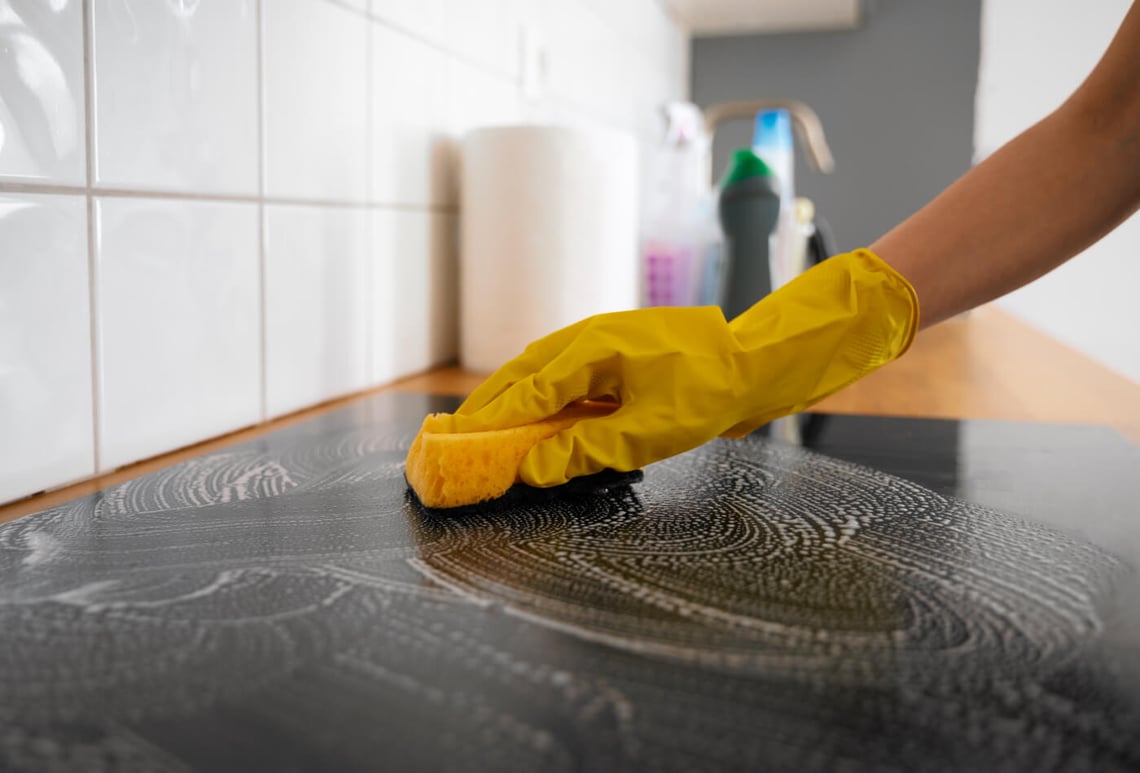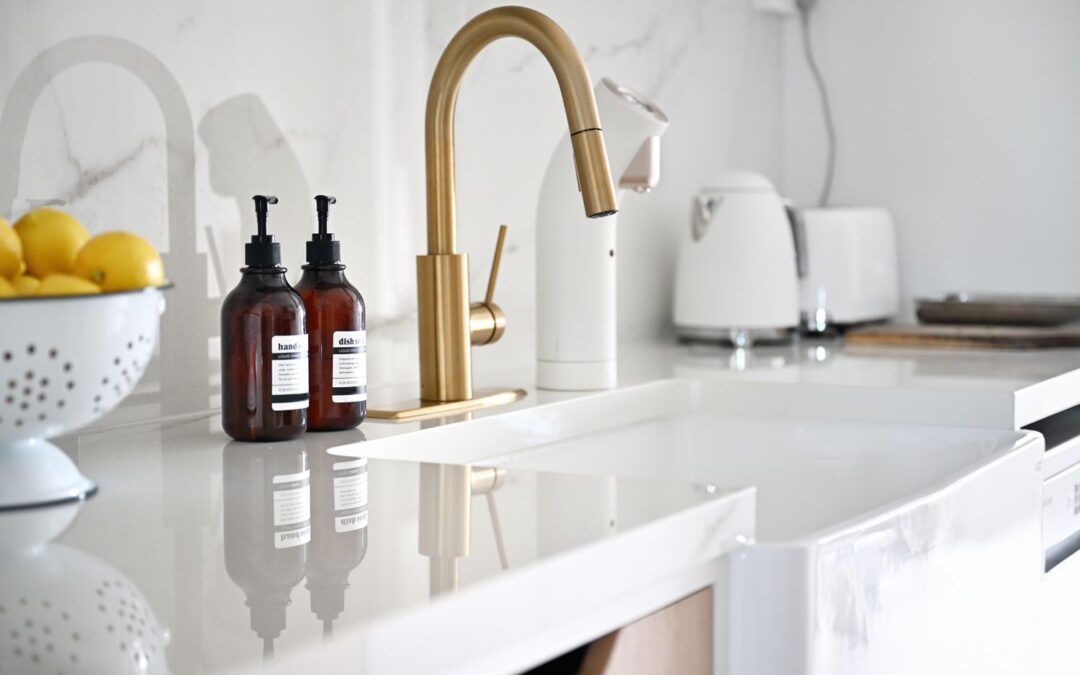Your kitchen countertop is one of the busiest spots in your home. It’s where you prep meals, enjoy snacks, and sometimes even work or chat with family.
But keeping it clean can be tricky, especially since different countertops need different care. If you’re tired of guessing what cleaner to use or worried about damaging your surface, this guide is for you. You’ll discover simple, effective ways to clean every type of kitchen countertop safely.
By the end, you’ll feel confident that your counters will stay spotless and last longer. Let’s dive in and make your kitchen shine like never before!
Choosing The Right Cleaner
Choosing the right cleaner is key to keeping kitchen countertops safe and spotless. Each countertop type needs a specific kind of care. Using the wrong cleaner can damage the surface or leave stains. Knowing what to use protects your investment and keeps your kitchen fresh.
Avoiding Harsh Chemicals
Harsh chemicals can harm many countertop materials. Acidic or abrasive cleaners may dull or etch surfaces like granite or marble. Avoid bleach, ammonia, and strong acids on natural stone. These chemicals can break down sealants and cause cracks. Always check product labels before applying.
For laminate and solid surfaces, harsh cleaners can strip protective coatings. This may lead to discoloration or peeling. Choose mild detergents instead. Protect your countertops by skipping products with rough chemicals.
Natural Cleaning Alternatives
Natural cleaners offer gentle and effective options. A mix of warm water and mild dish soap works well for most surfaces. Vinegar and baking soda can clean many countertops but avoid vinegar on stone. Olive oil and lemon juice can polish wood counters safely.
Natural cleaners reduce chemical exposure and environmental impact. They keep your kitchen safe for family and pets. Try these simple, affordable alternatives to maintain your countertops’ beauty and health.
Cleaning Granite Countertops
Granite countertops are a popular choice for kitchens. They look elegant and last a long time. Cleaning granite needs care to keep its shine and strength. Harsh cleaners can damage the surface. Use gentle methods to protect your countertop.
Daily Maintenance Tips
Wipe the granite surface every day with a soft cloth. Use warm water and mild dish soap. Avoid acidic or abrasive cleaners. Dry the surface to stop water spots. Use coasters for drinks and cutting boards for chopping. This stops scratches and stains. Clean spills quickly to prevent damage.
Removing Stains Safely
For stains, make a paste of baking soda and water. Apply the paste on the stain and cover it with plastic wrap. Leave it for a few hours or overnight. Gently wipe the area with a damp cloth after. Avoid using bleach or ammonia. These can dull the granite and cause cracks. Test any cleaner on a small spot first.
Cleaning Marble Surfaces
Marble countertops bring a timeless, elegant look to any kitchen. They are smooth and cool to the touch. Marble is a natural stone that needs gentle care. Cleaning marble properly keeps its shine and prevents damage. Using harsh cleaners can ruin its surface. Follow simple steps to keep marble counters beautiful for years.
Preventing Etching And Stains
Etching happens when acid touches marble. Acid comes from lemon, vinegar, or tomato. It leaves dull spots on the surface. Wipe spills quickly to stop etching. Use coasters under glasses to protect the stone. Avoid placing hot pots directly on marble. Heat can cause cracks and stains. Seal marble regularly to create a strong barrier. Sealing reduces stains and damage. Clean spills right away. Do not let liquids sit on marble.
Best Cleaning Methods
Use a soft cloth or sponge with warm water. Mild dish soap works well for daily cleaning. Avoid abrasive pads or brushes. They scratch the surface. Rinse with clean water to remove soap residue. Dry the countertop with a soft towel. For deeper cleaning, use a pH-neutral cleaner made for marble. Do not use bleach or ammonia. They harm the stone. Polish the marble occasionally to keep it shiny. Use products made for natural stone polishing.
Cleaning Quartz Countertops
Quartz countertops are popular for their durability and beauty. They resist stains and scratches well. Caring for them is simple with the right methods. Proper cleaning keeps the surface shiny and fresh. Avoid harsh chemicals to protect the finish. Follow easy steps to maintain quartz counters daily.
Routine Cleaning Practices
Use a soft cloth or sponge for daily cleaning. Mix warm water with mild dish soap. Wipe the countertop gently to remove dirt. Rinse with clean water to avoid soap residue. Dry the surface with a soft towel. This routine keeps quartz looking new longer.
Handling Tough Spots
For sticky or greasy spots, apply a gentle cleaner. Let it sit for a few minutes. Use a non-abrasive sponge to scrub softly. Avoid scrubbing hard to prevent scratches. Rinse the area well and dry it. Persistent stains may need a quartz-specific cleaner.
Cleaning Laminate Counters
Laminate countertops are popular for their affordability and variety of designs. They need gentle care to keep their surface smooth and bright. Cleaning them properly helps avoid damage and keeps your kitchen looking fresh.
Use soft cloths and mild cleaners to protect the laminate finish. Avoid harsh chemicals that can wear down the surface. Small daily cleaning habits make a big difference over time.
Avoiding Water Damage
Laminate counters can swell or peel if exposed to water for long. Wipe spills immediately to stop water from soaking in. Use a dry cloth after cleaning to remove leftover moisture. Keep edges and seams dry to prevent lifting or warping.
Never let water pool around sinks or appliances. Use coasters and trays to protect the surface from water rings and spills. Quick action keeps your laminate counters safe and looking new.
Effective Stain Removal
Stains can dull the look of laminate counters. Use a mixture of warm water and mild dish soap for most stains. Apply with a soft sponge and rub gently. Avoid scrubbing hard to prevent scratches.
For tougher stains, try a paste of baking soda and water. Apply it gently and rinse well afterward. Avoid bleach or strong chemicals that can damage the laminate surface. Regular cleaning prevents stains from setting in.

Credit: www.motorcitygranite.com
Cleaning Butcher Block Surfaces
Butcher block countertops add warmth and charm to any kitchen. They are made from wood strips glued together. These surfaces need gentle care to stay beautiful and last long. Cleaning butcher block counters correctly keeps them safe for food prep and prevents damage.
Daily Wiping And Oiling
Wipe butcher block surfaces with a soft cloth and warm water. Avoid soaking the wood. Dry the surface well after cleaning. Apply food-safe mineral oil to the wood once a week. This oil keeps the wood from drying out and cracking. Spread the oil evenly with a clean cloth. Let it soak in for a few hours, then wipe off the extra. Regular oiling protects and refreshes the wood.
Disinfecting Safely
Use a mild vinegar solution to disinfect butcher block counters. Mix one part white vinegar with four parts water. Spray the solution on the surface and let it sit for a few minutes. Wipe it off with a clean cloth. Avoid harsh chemicals or bleach. These can damage the wood and affect food safety. For tough stains, use coarse salt and a lemon half. Rub gently, then rinse and dry. This method cleans and disinfects naturally.
Cleaning Concrete Countertops
Concrete countertops offer a modern, sturdy look to any kitchen. They are durable but need special care to stay beautiful. Proper cleaning keeps the surface smooth and free from stains. Understanding how to clean concrete countertops helps protect your investment.
Sealing For Protection
Concrete is porous and can absorb liquids. Sealing creates a barrier against stains and moisture. Apply a good quality sealer every 1-2 years. This keeps the surface strong and easier to clean. Always follow the sealer instructions for best results.
Cleaning Without Damage
Use a soft cloth or sponge with mild soap and warm water. Avoid harsh cleaners or acidic products like vinegar. These can break down the sealer and damage the concrete. Wipe spills quickly to prevent stains. Dry the surface after cleaning to avoid water spots.
Cleaning Stainless Steel Counters
Stainless steel countertops look modern and sleek in any kitchen. They resist heat and stains well. But they can show fingerprints and smudges easily. Cleaning these counters often keeps them shiny and fresh. Using the right methods protects the surface and keeps it smooth.
Removing Fingerprints And Smudges
Use a soft cloth or microfiber towel for cleaning. Dampen it with warm water and wipe the surface gently. For tougher marks, add a few drops of mild dish soap. Rub the area in the direction of the steel grain. Rinse with a clean damp cloth to remove soap. Dry the counter with a dry towel to avoid water spots.
Avoiding Scratches
Avoid abrasive cleaners or scrubbers on stainless steel. Do not use steel wool or rough sponges. Use non-abrasive cloths for wiping and cleaning. Place cutting boards or mats under heavy items. Clean spills quickly to prevent damage. This keeps the steel smooth and scratch-free.
Preventive Tips For All Countertops
Taking care of kitchen countertops starts with simple habits. These habits keep surfaces clean and damage-free. Preventive tips work for all types of countertops. They help save money and time. They also keep your kitchen looking fresh and new.
Using Cutting Boards
Cutting directly on countertops can cause scratches and stains. Use cutting boards for chopping fruits, vegetables, and meats. Choose boards made of wood or plastic. Clean cutting boards after each use to avoid bacteria. This habit keeps countertops safe and smooth.
Avoiding Heat Damage
Hot pots and pans can burn or crack countertop surfaces. Always place hot items on heat-resistant mats or trivets. Do not put hot cookware directly on granite, marble, or laminate. Preventing heat damage keeps countertops strong and looking good. This simple step extends the life of your kitchen counters.

Credit: www.work-tops.com

Credit: uk.news.yahoo.com
Frequently Asked Questions
How Do I Clean Granite Kitchen Countertops Safely?
Use a mild dish soap and warm water with a soft cloth. Avoid acidic cleaners or abrasives to prevent damage. Seal granite surfaces yearly to maintain their stain resistance and durability.
What Is The Best Cleaner For Marble Countertops?
Use a pH-neutral cleaner or mild dish soap with water. Avoid acidic or abrasive products, which can etch and dull marble surfaces. Wipe spills immediately to prevent stains.
Can I Use Vinegar To Clean Laminate Countertops?
No, vinegar is acidic and can damage laminate surfaces. Instead, use mild soap and warm water with a soft cloth for cleaning. Dry thoroughly to avoid water damage.
How Do I Remove Stains From Quartz Countertops?
Use a non-abrasive cleaner and a soft sponge for stains. Avoid harsh chemicals and scrubbing pads. For stubborn stains, a mixture of baking soda and water can help.
Conclusion
Keeping kitchen countertops clean protects their beauty and your health. Use the right cleaner for each surface type. Avoid harsh chemicals that can cause damage. Regular cleaning stops stains and germs from building up. Small efforts daily make a big difference over time.
Clean counters also make cooking safer and more pleasant. Remember, gentle care helps your countertops last longer. A clean kitchen feels fresh and inviting every day.

As the chief content writer, Hassan Al Sarker works as a professional kitchen-based content creator at Kitchen Liker.
In addition to reviewing the content published on Kitchen Liker, he ensures that it is accurate, relevant, and helpful. As a result, all the reviews and information published at Kitchen Liker are neutral and userfriendly.
Hassan Al Sarker has a bachelor’s degree in Hotel and Tourism Management From the Newyork University. Before joining Kitchen Liker, he was a contributor at Kitchen Club, United States.

